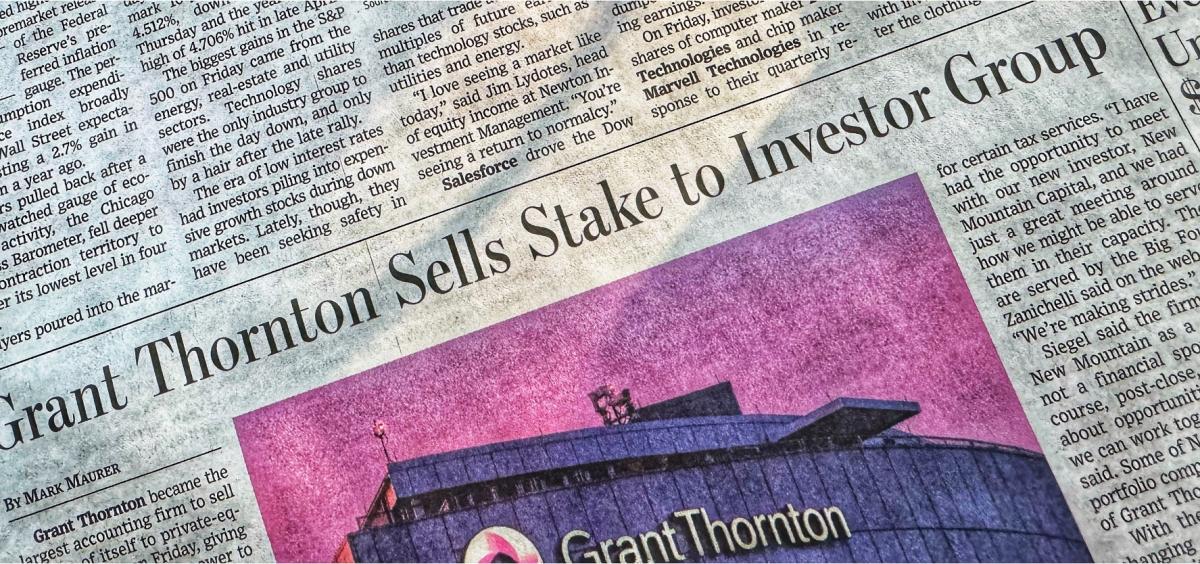By William (Bill) J. Kelly, CAIA, CEO, CAIA Association
Paul Munter is the chief accountant at the SEC. He was interviewed by the Wall Street Journal about six months ago on the topic of What Worries Him when it comes to auditor independence in the wake of some recent ‘breakdowns in practice.’ The Q&A format of this interview leads to some interesting observations about some of these recent trends and it is quite telling and maybe prescient when he said that it is “an appropriate time to reinforce messaging about the importance of firm culture, and that being a question not just with the audit practice, but for the entire firm (emphasis added).”
The acquisitive PE model has very few limitations, and aspirations aplenty, especially when it comes to businesses with sticky and recurring revenue. It is no wonder that professional services organizations such as public accountant firms are now high on their shopping list. The closing of the sale of a stake in Grant Thornton to New Mountain Capital is not the first such transaction in this space, but it is the latest and by far the largest, and perhaps raises the specter of the very concern cited by Chief Accountant Munter on his wall of worries.
According to the AICPA, accountants in public practice should be independent in fact and appearance when providing auditing and other attestation services. Clear, or clear as mud? State laws in the U.S. dictate the ownership structure of a CPA firm and require 50% or more of the ownership to be in the hands of the CPAs themselves. While a good start, a pile of capital in the hands of the minority shareholder can, at the margin and maybe even more so, compromise that independence which takes us down a very slippery slope.
In the case of the Grant Thornton (“GT”) deal, some chess pieces were rearranged to at least give the appearance of on-going (post close) independence. A new LLC was formed that took in all the ‘advisory, tax and nonaudit services’ of GT and New Mountain will now own 60% of that company. Not to worry though, the audit practice which is in the business of providing independent opinions for the benefit of the investing public is walled-off under the deal where the ‘U.S. audit business will remain a partnership.’ Really, not really!
Read on and you will find out that the new LLC will have a ‘contractual relationship with the audit business through a management services agreement’ and one can only wonder about the motivations behind a recent layoff of 3.5% of the U.S. workforce (including the audit practice) just a week before the deal closed. Does this demonstrate a certain level of pliancy for the new ‘minority’ owner or just a seasonal rightsizing of an existing business model? Time and future actions will certainly be telling.
KYC might now also mean Know Your CPA, but the diligent investor must always know their owner too, and the motivations that might influence their decision-making process.
Seek education, diversity of both your portfolio and people, and know your risk tolerance. Investing is for the long term.
DISCLOSURE: The author is an inactive CPA and a lapsed member of the New York State Society of CPAs. He is also a limited partner in the New Mountain Partners Fund VI.
About the Author:

William (Bill) J. Kelly, is the CEO of the CAIA Association with 30+ years in institutional asset management in successive CFO, COO, and CEO roles. A former CEO of Boston Partners and one of the founding partners of the predecessor firm, Boston Partners Asset Management, he's a global speaker and advocate for shareholder protection. Bill serves as Chairman of Boston Partners Trust Company and is an Advisory Board Member for the Certified Investment Fund Director Institute, which seeks to bring the highest levels of professionalism and governance to independent fund directors around the world. As a member of the board of the CAIA Association, Bill also represents CAIA in similar capacities via their global partnerships with other associations and global regulators.




